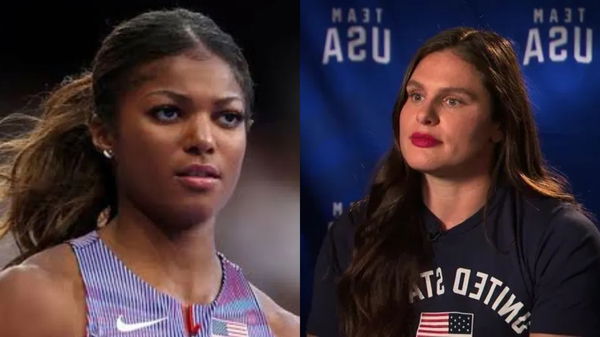
via Imago
Credits: Imago

via Imago
Credits: Imago
Suni Lee, Caeleb Dressel, Gabby Thomas, and many other top athletes have one thing in common: imposter syndrome- they feel they don’t deserve their success, even though they do. Take Gabby Thomas, for example. She went to Harvard for undergrad, won five Olympic medals, including three golds at the 2024 Paris Olympics, and also took home a silver and bronze at the 2020 Tokyo Olympics. Yet, she still struggled with feeling like an imposter. Why? Because sometimes, no matter how much you achieve, self-doubt creeps in. But does every athlete feel that way? Well, not our boss lady!
Remember when Olympic rugby star Ilona Maher was asked about imposter syndrome a few weeks ago? She confidently said, “I don’t have that. No, I don’t know what that is. It’s like when you don’t feel like you deserve it, right?” That confidence is enviable! Thomas had a similar moment in an interview recently with Jason Kelce’s wife Kylie McDevitt on the YouTube channel Not Gonna Lie. When asked how she deals with imposter syndrome, the 28-year-old revealed her story while appreciating Ilona’s confidence about imposter syndrome.
Gabby Thomas shared her thoughts on imposter syndrome, “I love that type of confidence (saying about Ilona) because, absolutely, I think that when you earn something, you should feel like you earned it, right? ” The importance of humility should not stop anyone from accurately describing their achievements. “If you earn something embody that.” Words to live by for sure!
ADVERTISEMENT
Article continues below this ad
During the interview, the Georgia native discussed feeling uneasy in new circumstances including both her Harvard (2018) admissions and her move to Austin Texas (2019). “I was not an Olympian,” she said, referencing the time she joined a group of Olympians, “and I felt like Oh, I don’t know if I’m going to do well here. Lets see.”

But Gabby didn’t let those uncomfortable moments define her. Instead, she welcomed them as opportunities to grow. “When I first got to Harvard, I knew I had earned it, but I definitely felt like, ‘I’m a little uncomfortable right now.’” She continued, “You just figure it out. You enter those spaces, and you find a way.”
That’s how she navigates challenges—by embracing discomfort and using it as a catalyst for growth. “Would I say that I felt like an impostor? No, I would never say that about myself. But would I say that I’ve definitely been in rooms where I felt a little uncomfortable? Absolutely. But I think we all should do that, right? It’s how you grow.” It’s all about embracing the challenge, and that’s how you level up. But how did she overcome this imposter syndrome?
ADVERTISEMENT
Article continues below this ad
What’s your perspective on:
Does imposter syndrome fuel greatness, or is it a hurdle athletes must overcome to succeed?
Have an interesting take?
Gabby Thomas’ battle with imposter syndrome
The year 2021 became significant for Gabby Thomas because she qualified for Team USA through the Olympic Trials. She won silver for the country in the 4x100m relay and bronze in the 200m during the Tokyo 2020 Olympics. Despite her major athletic victories, Thomas admits her self-doubts stem from imposter syndrome. The successful athlete continues to experience imposter syndrome both during her track races and in pursuit of her academic excellence.
Thomas remains busy on the track following that race. In 2023 Thomas struggled with injuries yet triumphed by winning silver in the 200m World Championship and securing gold together with her team in the 4x100m relay while establishing her new personal record of 21.60 seconds. Thomas achieved the fourth-most rapid 200m time ever recorded when she finished the race with 21.60 seconds. The recording of multiple achievements did not eliminate her internal self-doubts. She admitted that her past did not include being a star athlete as she continues to push herself to excel in unfamiliar situations each time she steps into a new environment.
ADVERTISEMENT
Article continues below this ad
Her struggles with feeling like she doesn’t belong started at Harvard. She was surrounded by some of the brightest minds, and even though she had earned her spot, she couldn’t shake the feeling that she didn’t belong. But instead of letting that stop her, she pushed through, telling herself, “I forced myself to be in that space until I did feel like I belonged there.” She didn’t just sit back; she worked relentlessly to prove to herself that she deserved to be there. “I was the first one at the track and the last one to leave,” she said. Her inner determination and drive finally allowed her to overcome those feelings.
She relocated to Austin to seek training with Olympians after that point. At that time she was invisible to everyone who might predict athletic success. She admitted with a laugh that she lacked any resemblance to Olympic status yet she pushed forward undeterred. She kept working, and now? She’s an Olympic gold medalist. Her story stands out because she acknowledges her battle with imposter syndrome even after winning gold. The experience pushes her to find new ways of using it for her personal development. That’s quite an approach! We sure are taking notes from Gabby Thomas.
ADVERTISEMENT
ADVERTISEMENT
ADVERTISEMENT
ADVERTISEMENT


Does imposter syndrome fuel greatness, or is it a hurdle athletes must overcome to succeed?